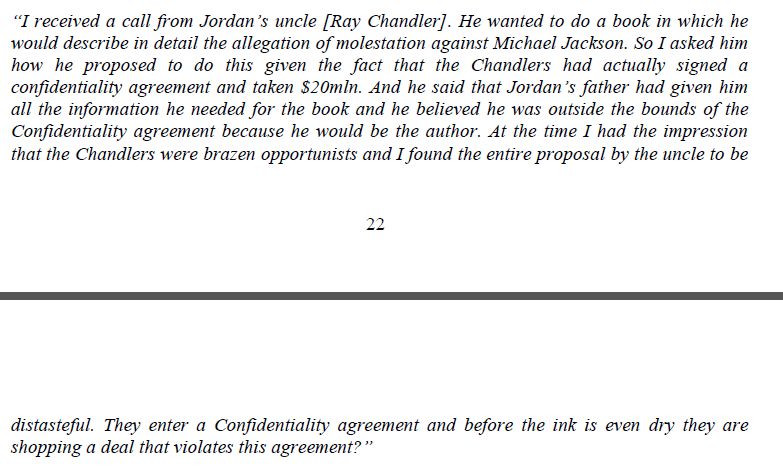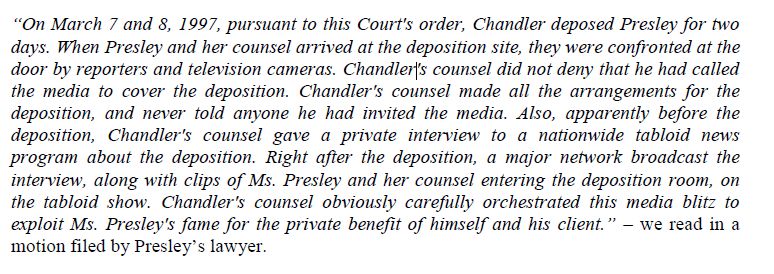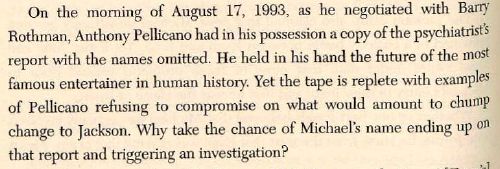
THREAD: "Why would an innocent person settle?" is a frequently asked question regarding the allegations against Michael Jackson. So here is the answer. #falseallegations #MichaelJackson
The suggestion that innocent people would not settle is fallacious. There can be many situations where an innocent person would settle. A settlement in itself doesn't indicate guilt, you have to know the context. So let me show you the context of the settlement in the MJ case.
First of all, let us clear up what exactly was settled. There were two proceedings going on in MJ’s case parallel: a criminal investigation conducted by the State of California and a civil lawsuit filed by the accusing family, the Chandlers.
Only the criminal proceedings and a criminal trial can result in jail time for the alleged perpetrator. At the end of a civil trial, the only restitution available is monetary.
The settlement settled the civil lawsuit, not the criminal. The criminal proceedings proceeded after this settlement and nothing in the settlement prevented the Chandlers from testifying against MJ in a criminal court.
Los Angeles district attorney, Gil Garcetti even stated right after the settlement that the Chandlers’ attorney, Larry Feldman promised him “that the alleged victim will be allowed to testify".
The Chandlers could have taken the settlement money AND testified against MJ in a criminal case. They chose not to, but it was not because they were forbidden to do so by the settlement, but because they were never interested in the criminal proceedings in the first place!
Their only focus was money from the very beginning. Ray Chandler's (the uncle of the accuser, Jordan Chandler) own book states that the Chandlers filed their civil lawsuit on Septemeber 8, 1993 with a "highly profitable settlement" in mind.
It is important to emphasize that it was the Chandler family who demanded a settlement from the very beginning and it was not Michael Jackson who sought or offered it!
Normally civil complaints are filed after criminal proceedings are completed and justice's been served or when there's no possibility for a criminal trial. One would naturally expect the parents of a molested child to pursue justice, not money when they have the chance to do so.
The Chandlers, however, never really wanted a criminal trial. Their focus was always on the civil proceedings, ie. money. And to achieve their settlement goal, the Chandler's attorney, Larry Feldman played the California legal system masterfully.
He pushed for getting the civil trial ahead of a possible criminal trial. That put a
pressure on Jackson’s legal team, because if the civil trial is held before the criminal trial in the same matter, it can compromise a defendant's right to a fair criminal trial.
pressure on Jackson’s legal team, because if the civil trial is held before the criminal trial in the same matter, it can compromise a defendant's right to a fair criminal trial.
Why? Because it can give the prosecution in the criminal trial a major advantage, because they have the opportunity to monitor the civil trial, study the defense’s strategy and adjust their claims and strategy in kind.
In addition, the burden of proof is more relaxed in a civil trial than in a criminal trial. Civil trials aren't really designed for a fair discussion of criminal matters.
There have been many precedents where civil proceedings were frozen to allow the criminal trial ahead, preserving a defendant’s right to a fair criminal trial and preventing that right from being violated.
In MJ’s case, however, all such attempts by MJ’s lawyers to stay the civil proceeding were dismissed by the Judge because he accepted the Chandler's argument that due to Jordan's age and because "a child's memory is developing", they were entitled to a speedy CIVIL trial.
Apparently MJ's right to a fair criminal trial was a less important right in this case.
Under extremely unfavorable conditions, MJ and his attorneys might have found themselves in a position where they would have had to fight and defend Jackson on two fronts at the same time – in both a civil and criminal trial.
On top of that they would have to prepare for a civil trial within 120 days, while the police for the criminal proceedings had seized all of Jackson’s personal records and refused to provide copies or even a list of what they took.
Once again: The Chandlers were NEVER interested in the criminal case. Remember, only a criminal procedure can put someone in jail!
In fact, their book quotes a conversation between their attorney Feldman and the boy's father Evan Chandler where they discuss their horror at the prospect of a possible indictment of Jackson...
because that would have meant their pet project, the civil proceedings (ie. money) would have been pushed behind the criminal proceedings! 



“So we don’t want that” – said the Chandler side regarding the possibility of a criminal indictment of Jackson. Let that sink in, while keeping in mind that only a criminal trial can send an alleged perpetrator to jail; a civil trial can only result in a monetary award!
The California law that allowed the Chandlers to push the civil trial ahead of the criminal trial was changed eventually – according to Santa Barbara DA, Thomas Sneddon directly because of what happened in the Chandler case.
Because of that change, today an accuser in a sexual assault case cannot pursue a civil lawsuit right away. The new law restricts a civil trial from preceeding a criminal trial in the same matter.
However, that did not apply to Jackson back in 1993. After all motions to push the civil proceedings behind the criminal had been denied, the Jackson team was left between a rock and a hard place.
So to preserve his chances for a fair criminal trial, he was pressured to settle the civil case. The hostile and unfair media campaign against him, and his health and dependency issues might have also contributed to a decision to settle.
While MJ’s motives for the settlement are often questioned, it is a much less frequently asked question (though it would be similarly valid to ask): why did the accuser’s family so aggressively push for a settlement while doing everything in their power to avoid a criminal trial?
Their reasoning was that they wanted to move on with their lives and not subject Jordan to media spotlight and scrutiny that would have been unavoidable in a high profile case and trial such as this. They claimed that they were also scared of the wrath of Jackson’s fans.
At first sight this may seem reasonable, however, when we take a closer look at the case, this claim falls apart.
First, one of the reasons Evan Chandler hired Barry Rothman as his initial lawyer, according to a secretly taped phone conversation, was because Rothman was "hungry for the publicity" and "all he wants to do is get this out in the public as fast as he can, as big as he can".
Instead of being publicity-shy, the Chandlers were very much looking for publicity. There are good reasons to believe that the Chandlers fed National Enquirer articles about the case in 1993 and Ray Chandler’s book calls another journalist, Diane Dimond, Evan’s “closest ally”.
The Chandlers did not seem to be concerned about media spotlight, fan reactions, threats or Jordan not being able to move on with his life, when within days after the settlement, in January 1994, they were shopping a book about the allegations. Publisher Judith Regan: 

That Ray Chandler was indeed shopping a book within days of the settlement, was admitted in a 2004 court motion by Ray Chandler himself.
Because of the confidentiality agreement involved in the settlement, Evan was not allowed to write a book or do media rounds himself, but they got around that by his loyal brother Ray Chandler doing all the public talking for them.
Ray’s book eventually was published ten years later, in 2004 at the height of the media frenzy caused by the Arvizo allegations. At the time, Ray made his rounds in the media, giving interviews and appearing in documentaries heavily biased against Jackson. He even ran a website.
Obviously not concerned about media spotlight, not afraid of possible threats by Jackson fans and not worried about how it might affect Jordan’s ability to move on.
The irony of this all was that because Ray Chandler claimed in media interviews that he had evidence to prove Jackson’s guilt, Jackson’s defense team called his bluff and subpoenaed him to appear at Jackson’s 2005 trial, present his alleged evidence and give testimony there.
However, Ray Chandler, rather than take this opportunity to help finally convict a person he alleged had molested his nephew, instead fought tooth and nail against the subpoena and eventually managed to avoid having to appear in court and testify under oath.
Whenever it came to having to appear in court, esp. a criminal court, the Chandlers were suddenly shy of publicity, scared of MJ fans.Not so much when it came to feeding tabloids,publishing a book, running a website or appearing in media interviews and tabloidish “documentaries”.
The Chandlers also did not seem to be concerned about media spotlight, possible fan reactions, threats and Jordan not being able to move on with his life, when Evan filed another lawsuit against Michael Jackson in 1996, this time for $60 million...
...and a record deal so that he could release a music album about the alleged sexual molestation of his son. (Yes, you read that correctly!)
In the lawsuit Evan accused Jackson of violating the confidentiality agreement of their 1994 settlement when Jackson maintained his innocence in a 1995 interview with Diane Sawyer.
During that lawsuit the Chandlers, far from being media-shy, played the media again for their benefit. Evidence of that can be found in court documents. Eg. we learn from them that when the Chandlers deposed MJ's ex-wife, Lisa Marie Presley, they tried to use that for publicity. 

So, as you can see for the Chandlers it was all about the money, all along.
The Chandlers had all the possibilities in the world to push through with a criminal trial. The prosecution and the DAs were totally willing to prosecute MJ and bring the case to trial.
It was not a case of reluctant prosecution. It was a case of an accusing family who were always pushing for the money and were never interested in the criminal proceedings. In fact, they ran away when it came to telling their story in a criminal court.
Mind you, the 13-year-old boy, Jordan Chandler did not come up with his allegations on his own, spontaneously. He was pressured by his father, Evan to say what he wanted to hear and then this same father used these allegations to try to extort money out of MJ.
When that failed and MJ refused to pay them off, that's when they went to authorities and kick started the public scandal. The Chandlers cynically boast in their own book(!): 



When Jackson turned down the Chandler's monetary demands and the Chandlers went public with their claims in answer, they only used that to further push for money, by putting the pressure of bad publicity on MJ and by steering the case towards "a highly profitable settlement".
Had MJ really want to hush the accuser he could have before they went public and went to authorities because the Chandlers admittedly wanted nothing more than being paid-off. It was MJ who refused to pay such hush money!
So this is the background story and context of Michael Jackson's settlement with the Chandler family. More details about the case here: …onallegationsblog.files.wordpress.com/2018/09/the-mi…
• • •
Missing some Tweet in this thread? You can try to
force a refresh








